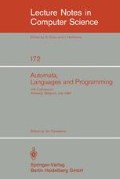Abstract
In this paper we present some space/time efficient Turing machine algorithms for recognizing some subclasses of DCFL's. In particular, we show that the finite minimal stacking and “simple” strict restricted (a subclass of strict restricted) deterministic pushdown automata (FMS-DPDA's SSR-DPDA's, respectively) can be simulated by offline Turing machines simultaneously in space S(n) and time n2/S(n) for any tape function S(n) satisfying log n ≤ S(n) ≤ n which is constructable in n2/S(n) time. Related techniques can be used to give interesting characterizations of 2-head 2-way finite automata, both deterministic and nondeterministic. In particular we show that a 2-head 2-way deterministic finite automataton is equivalent to a simple type of 2-way deterministic checking stack automaton. This is in contrast to a result which shows that 2-way nondeterministic checking stack automata are equivalent to nondeterministic linear bounded automata. We also show that a language L is accepted by a 2k-head two-way nondetermistic finite automaton if and only if it is accepted by a k-head two-way nondeterministic pushdown automaton which makes at most one reversal on its stack.
This research was supported in part by NSF Grants MCS 81-02853 and MCS 83-04756.
Preview
Unable to display preview. Download preview PDF.
References
Braunmuhl, B. and Verbeek, R., A recognition algorithm for deterministic CFLs optimal in time and space, Proc. 21st IEEE-FOCS, pp. 411–420 (1980).
Cook, S., An observation on time-storage tradeoff, JCSS, Vol. 9, pp. 308–316 (1974).
Cook, S., Deterministic CFL's are accepted simultaneously in polynomial time and log squared space, Proc. 11th ACM Symp. on Theory of Comp., pp. 338–345 (1979).
Fischer, P., Meyer, A. and Rosenberg, A., Counter machines and counter languages, MST, Vol. 2, No. 3, pp. 265–283 (1968).
Galil, Z., Two-way deterministic pushdown automaton languages and some open problems in the theory of computing, MST, Vol. 10, pp. 211–228 (1977).
Ginsburg, S. and Harrison, M., Backeted context-free languages, JCSS, Vol. 1, pp. 1–23 (1967).
Greibach, S., Checking automata and one-way stack languages, JCSS, Vol. 3, pp. 196–217 (1969).
Gurari, E. and Ibarra, O., Path systems: constructions, solutions and applications, SIAM J. Comput., Vol. 9, No. 2, pp. 348–374 (1980).
Hopcraft, J. and Ullman, J., Unified theory of automata, The Bell System Technical J., Vol. 46, No. 8, pp. 1793–1829 (1967).
Ibarra, Q., Characterizations of some tape and time complexity classes of Turing Machines in terms of multihead and auxiliary stack automata, JCSS, Vol. 5, No. 2, pp. 88–117 (1971).
Ibarra, O., On two-way multihead automata, JCSS, Vol. 7, pp. 28–36 (1973).
Igarashi, Y., Tape bounds for some subclasses of deterministic context-free languages, Information and Control, Vol. 37, pp. 321–333 (1978).
Igarashi, Y., The tape complexity of some classes of Szilard languages, SIAM J. Comput., Vol. 6, No. 3, pp. 461–466 (1977).
Lewis, P., Hartmanis, J., and Stearns, R., Memory bounds for the recognition of context-free and context-sensitive languages, IEEE Conf. Record on Switching Circuit Theory and Logic Design, pp. 191–202 (1965).
Lipton, R. and Zalcstein, Y., Word problems solvable in logspace, Computer Science Department, Yale University, Tech. Report #6 (1976).
Lynch, N., Logspace recognition and translation of parenthesis languages, JACM, Vol. 24, No. 4, pp. 583–590 (1977).
Mehlhorn, K., Bracket-languages are recognizable in logarithmic space, Information Processing Letters, Vol. 5, No. 6, pp. 168–170 (1976).
Moriya, E., Associate languages and derivational complexity of formal grammars and languages, Information and Control, Vol. 22, pp. 139–162 (1973).
Richie, R. and Springsteel, F., Language recognition by marking automata, Information and Control, Vol. 20, pp. 313–330 (1972).
Sudborough, I., A note on tape-bounded complexity classes and linear context-free languages, JACM, Vol. 22, No. 4, pp. 499–500 (1975).
Sudborough, I., On tape-bounded complexity classes and multihead finite automata, JCSS, 10, pp. 338–345 (1979).
Sudborough, I., On deterministic context-free languages, multihead automata, and the power of an auxiliary pushdown store, 8th Annual ACM Symp. on Theory of Computing, pp. 141–148 (1976).
Valiant, L., Decision problems for families of deterministic pushdown automata, Ph.D. thesis, University of Warwick, U.K. (1973).
Verbeek, R., Time-space trade-offs for general recursion, Proc. 22nd IEEE-FOCS, pp. 228–234 (1981).
Author information
Authors and Affiliations
Editor information
Rights and permissions
Copyright information
© 1984 Springer-Verlag Berlin Heidelberg
About this paper
Cite this paper
Ibarra, O.H., Kim, S.M., Rosier, L.E. (1984). Space and time efficient simulations and characterizations of some restricted classes of PDAS. In: Paredaens, J. (eds) Automata, Languages and Programming. ICALP 1984. Lecture Notes in Computer Science, vol 172. Springer, Berlin, Heidelberg. https://doi.org/10.1007/3-540-13345-3_22
Download citation
DOI: https://doi.org/10.1007/3-540-13345-3_22
Published:
Publisher Name: Springer, Berlin, Heidelberg
Print ISBN: 978-3-540-13345-2
Online ISBN: 978-3-540-38886-9
eBook Packages: Springer Book Archive

